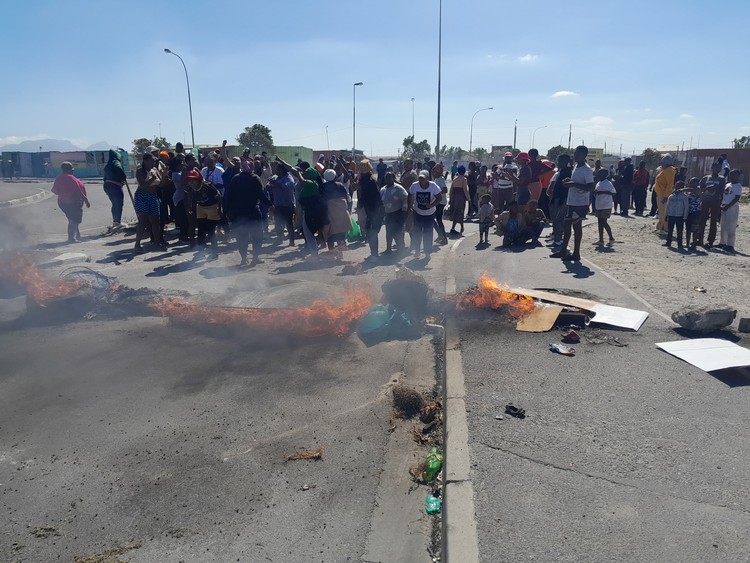Crime hits sanitation services in Khayelitsha
City of Cape Town teams can only come out when security is available
Residents of Town Two in Khayelitsha blocked roads at the weekend, demanding electricity, water and better sanitation. Photo: Vincent Lali
- Parts of Khayelitsha can’t be serviced properly by City of Cape Town sanitation teams because of high crime rates, says the City.
- Residents protested at the weekend demanding electricity, water and better sanitation.
- The City says sanitation teams must be accompanied by security escorts which are not always available.
- Taps are to be installed from this month.
City of Cape Town sanitation teams are unable to service parts of Khayelitsha promptly because of high crime rates, the City has confirmed.
Mayoral Committee Member for Water and Sanitation Zahid Badroodien told GroundUp that “due to the safety risk in Khayelitsha, City teams can only access the area with security escorts who need to be arranged to safeguard teams while they are working on site”.
“This unfortunately means that City teams are not necessarily able to attend to service requests as soon as they would like.”
Badroodien was responding to questions from GroundUp following a protest on Saturday in which residents of Level Two informal settlement barricaded Walter Sisulu Road near Khayelitsha Mall with burning tyres. The protest disrupted traffic, delaying taxi services and blocking access to the mall.
The protesters were demanding electricity, water and better sanitation. The settlement is on land owned by the City.
The residents rely on water taps they installed themselves in 2021. But the supply is erratic.
“Because of low pressure, our taps don’t produce water during the daytime when everybody uses water,” said Mabhelandile Twani, chairperson of land occupiers’ organization Intlungu Yabahlali Basematyotyomben.
Badroodien said plans were in place to install 80 taps in the settlement, starting in April. Additional toilets would be installed in the 2025/26 financial year, which starts in July, he said.
Twani said the chemical toilets “strip us of our dignity”. The City struggles to maintain these toilets, he said. “The cleaning company doesn’t always come because Law Enforcement is not available to escort them.”
Badroodien said the last toilet service in the area was conducted on Friday, 28 March. Responding to a complaint expressed by protesters that the contracted cleaning company had asked residents to clean their own toilets because there was no water, Badroodien said water was not necessary for the suction of waste from the chemical toilets. The toilets were cleaned by janitors, he said.
On the protesters’ demand for electricity, Mayco member for Human Settlements Carl Pophaim said the City would conduct a survey of the settlement to count the homes. “The City will then send that information to Eskom for application of funds and approval.”
Many households resort to illegal electricity connections from nearby formal houses, Chuma Primary School, or streetlights. However, not everyone can afford the necessary wiring.
“Almost half of the residents staying here have no electricity because they are too poor to buy wires,” Twani explained.
Those without illegal connections rely on rechargeable lamps and candles. “We want to get electricity legally because heavy rains damage our illegal connections and leave us without power,” said Twani. “We are willing to pay for electricity.”
Ayema Bhadashe, who lives with her husband and three children, said she pays R200 a month to a nearby house for electricity. But thieves frequently steal the electrical wires, leaving the family without electricity for two to three weeks.
Bhadashe has to wait for her children’s social grants before she can replace the wires. “Sometimes they steal the wires when I don’t have money for paraffin and candles, so I don’t cook,” she added.
She also claimed that criminals demand protection fees from residents who connect to Eskom wires. “They say they are guarding our electrical wires and preventing other thugs from stealing them, and they make residents pay R150 monthly.”
Support independent journalism
Donate using Payfast

Don't miss out on the latest news
We respect your privacy, and promise we won't spam you.
Next: Tariffs: Trump is punishing poor countries which export more to the US than they import
Previous: West Coast surfers go for gold in Para Surfing Championships
© 2025 GroundUp. This article is licensed under a Creative Commons Attribution-NoDerivatives 4.0 International License.
You may republish this article, so long as you credit the authors and GroundUp, and do not change the text. Please include a link back to the original article.
We put an invisible pixel in the article so that we can count traffic to republishers. All analytics tools are solely on our servers. We do not give our logs to any third party. Logs are deleted after two weeks. We do not use any IP address identifying information except to count regional traffic. We are solely interested in counting hits, not tracking users. If you republish, please do not delete the invisible pixel.

